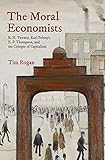The Moral Economists : R. H. Tawney, Karl Polanyi, E. P. Thompson, and the Critique of Capitalism / Tim Rogan.
Material type: TextPublisher: Princeton, NJ : Princeton University Press, [2017]Copyright date: ©2018Description: 1 online resource (280 p.)Content type:
TextPublisher: Princeton, NJ : Princeton University Press, [2017]Copyright date: ©2018Description: 1 online resource (280 p.)Content type: - 9780691173009
- 9781400888023
- Capitalism -- Moral and ethical aspects
- Capitalism
- Kapitalismus
- Kritik
- Socialism
- Thompson, E. P. (Edward Palmer), 1924-1993
- Wirtschaftsethik
- Ökonomische Ideengeschichte
- HISTORY / Europe / Great Britain / General
- Adult education
- Amartya Sen
- Antipathy
- Authoritarianism
- Calculation
- Cambridge University Press
- Capitalism
- Christian left
- Christian socialism
- Collectivism
- Communism
- Corporatism
- Criticism of capitalism
- Criticism
- Critique
- Determination
- Double Movement
- E. P. Thompson
- Economic history
- Economic problem
- Economics
- Economism
- Economist
- Eric Hobsbawm
- Ethics
- Evan Durbin
- Form of life (philosophy)
- Graham Wallas
- Guild socialism
- György Lukács
- Homo economicus
- Hostility
- Ideology
- Individualism
- Institution
- Intellectual history
- Interwar Britain
- J. B. Priestley
- John Macmurray
- John Maynard Keynes
- Joseph Needham
- Karl Mannheim
- Karl Polanyi
- Kenneth Arrow
- Laissez-faire
- Lecture
- Left-wing politics
- Leninism
- Liberalism
- Literature
- Marxian economics
- Marxism
- Michael Polanyi
- Modernity
- Moral economy
- Morality
- Natural theology
- Perry Anderson
- Philosopher
- Philosophy
- Political economy
- Political party
- Political philosophy
- Politician
- Politics
- Principle
- Protestantism
- R. H. Tawney
- Rationality
- Secularization
- Seminar
- Skepticism
- Social Action
- Social choice theory
- Social issue
- Social order
- Social revolution
- Social science
- Social theory
- Sociology
- Stalinism
- Suggestion
- The Great Transformation (book)
- The Making of the English Working Class
- The Wealth of Nations
- Theory
- Thomas Hobbes
- Thomas Robert Malthus
- Totalitarianism
- Trade union
- Unemployment
- Utilitarianism
- Value (ethics)
- Victor Gollancz
- Vilfredo Pareto
- Wealth
- Welfare economics
- Welfare state
- Welfare
- Writing
- online - DeGruyter
| Item type | Current library | Call number | URL | Status | Notes | Barcode | |
|---|---|---|---|---|---|---|---|
 eBook
eBook
|
Biblioteca "Angelicum" Pont. Univ. S.Tommaso d'Aquino Nuvola online | online - DeGruyter (Browse shelf(Opens below)) | Online access | Not for loan (Accesso limitato) | Accesso per gli utenti autorizzati / Access for authorized users | (dgr)9781400888023 |
Frontmatter -- Contents -- Introduction -- R. H. Tawney -- Karl Polanyi -- Capitalism in Transition? -- E. P. Thompson -- Conclusion -- Acknowledgments -- Notes -- Index
restricted access online access with authorization star
http://purl.org/coar/access_right/c_16ec
A fresh look at how three important twentieth-century British thinkers viewed capitalism through a moral rather than material lensWhat’s wrong with capitalism? Answers to that question today focus on material inequality. Led by economists and conducted in utilitarian terms, the critique of capitalism in the twenty-first century is primarily concerned with disparities in income and wealth. It was not always so. The Moral Economists reconstructs another critical tradition, developed across the twentieth century in Britain, in which material deprivation was less important than moral or spiritual desolation.Tim Rogan focuses on three of the twentieth century’s most influential critics of capitalism—R. H. Tawney, Karl Polanyi, and E. P. Thompson. Making arguments about the relationships between economics and ethics in modernity, their works commanded wide readerships, shaped research agendas, and influenced public opinion. Rejecting the social philosophy of laissez-faire but fearing authoritarianism, these writers sought out forms of social solidarity closer than individualism admitted but freer than collectivism allowed. They discovered such solidarities while teaching economics, history, and literature to workers in the north of England and elsewhere. They wrote histories of capitalism to make these solidarities articulate. They used makeshift languages of “tradition” and “custom” to describe them until Thompson patented the idea of the “moral economy.” Their program began as a way of theorizing everything economics left out, but in challenging utilitarian orthodoxy in economics from the outside, they anticipated the work of later innovators inside economics.Examining the moral cornerstones of a twentieth-century critique of capitalism, The Moral Economists explains why this critique fell into disuse, and how it might be reformulated for the twenty-first century.
Mode of access: Internet via World Wide Web.
In English.
Description based on online resource; title from PDF title page (publisher's Web site, viewed 01. Dez 2022)


